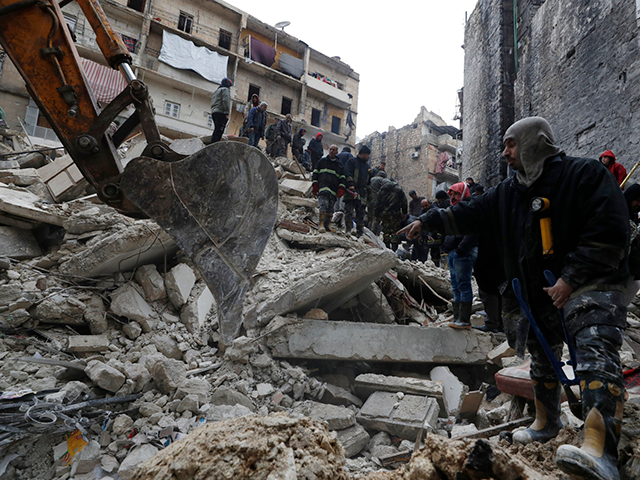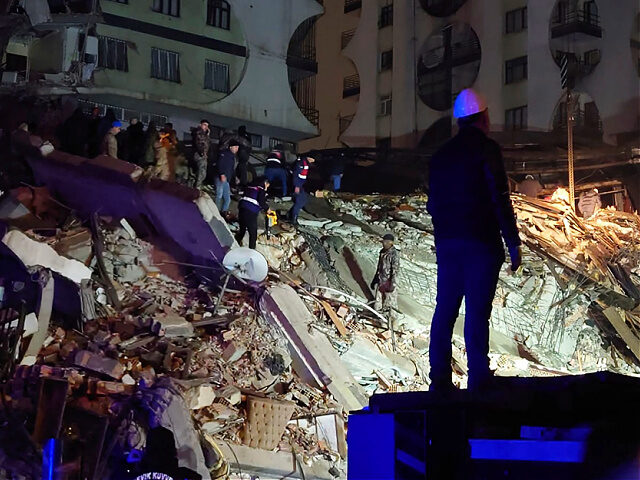Chinese officials and state media on Wednesday sought to portray the United States as “cold-hearted” and cheap because it has not lifted sanctions against the homicidal Syrian dictatorship supported by Beijing in the wake of Monday’s devastating earthquakes.
Chinese Foreign Ministry spokeswoman Mao Ning sought to blame the United States for prolonging “years of war and turmoil” by supporting opponents of Syrian dictator Bashar Assad.
“The U.S. has long been engaged in the Syrian crisis. Its frequent military strikes and harsh economic sanctions have caused huge civilian casualties and taken away the means to subsistence of the Syrians,” Mao charged.
“As we speak, the US troops continue to occupy Syria’s principal oil-producing regions. They have plundered more than 80% of Syria’s oil production and smuggled and burned Syria’s grain stock. All this has made Syria’s humanitarian crisis even worse,” she raved.
“In the wake of the catastrophe, the U.S. should put aside geopolitical obsessions and immediately lift the unilateral sanctions on Syria, to unlock the doors for humanitarian aid to Syria,” she concluded.
The talking point about “stealing” Syria’s oil is a frequent accusation leveled by the Assad regime and denied by Washington. Radio Free Asia (RFA) noted in January that even before the earthquake, Chinese officials had grown fond of repeating unsubstantiated claims by the Assad regime that bands of Kurdish fighters and American soldiers were hauling off vast quantities of oil in huge truck convoys.
The Syrian regime also considers the contract between a U.S. oil company called Delta Crescent Energy and the Kurdish-led Syrian Democratic Forces (SDF) to develop oil resources in SDF-controlled territory to be illegitimate, so all products of that agreement are derided as “piracy” by the Assad regime and its partners in Russia, China, and Iran.
Mao probably got the “plundered more than 80% of Syria’s oil” talking point by quoting the Assad regime’s oil minister, Bassam Toma’a, who claimed in 2021 that forces backed by the U.S. government control that percentage of Syria’s oil fields.
As for crop burning, a good deal of that occurs in Syria, and while many of the warring factions of Syria have been known to use starvation as a weapon, Beijing’s friends in Damascus are indisputably the primary culprits.

Syrian Civil Defense workers and security forces search through the wreckage of collapsed buildings, in Aleppo, Syria, Monday, Feb. 6, 2023. (AP Photo/Omar Sanadiki)
Mao was amusingly vague when asked exactly what China is doing to help Syria, which is a notoriously difficult place for anyone to operate much-needed humanitarian programs, including the United Nations.
China’s state-run Global Times jumped in on Wednesday with an editorial blasting the U.S. and its allies for not working more closely with the odious Assad regime, and for supposedly being parsimonious with relief money.
“For instance, due to the blockade and sanctions, there is no fuel even to send aid and rescue convoys. But such a humanitarian disaster is not enough to melt the cold-blooded heart of the U.S.,” the Global Times sneered.
The Chinese propagandists could only pretend to be interested in humanitarian relief for a few paragraphs before launching into a tirade about America allegedly putting its political interests ahead of human compassion:
What the US can offer is just a drop in the sea to the US, but for Syrian people who are facing an uncertain future, it is not only urgent but also life-saving. If the US has any conscience, it shouldn’t leave no chance of survival to them at this critical juncture. Syrian lives matter.
Natural disasters and crises have nothing to do with politics. Unfortunately, it is not the case with the US. Just last August, when a fire in a Cuban oil storage facility killed, injured, and displaced Cubans and exacerbated the country’s energy crisis and US sanctions were blocking life-saving relief to Cuba, the US only offered “technical support,” with no mention of sending specific material aid to Cuba, let alone lifting at least some of the sanctions.
For a long time, Washington has classified Syria as a “dictatorship.” The US’ narrative of splitting the world into two with so-called dictatorship and democracy actually covers up its true intention of dividing the world according to US interests.
“The U.S. diplomatic notion centered on its hegemony falls into pieces in the face of China’s efforts to jointly build a community with a shared future for mankind,” the Global Times concluded after wildly over-praising the tiny amount of money China has sent to Syria for earthquake relief.
The U.S. State Department noted this week that it has provided over $15 billion in humanitarian assistance to the Syrian people since the beginning of Assad’s brutal civil war.
“These funds go to the Syrian people, not the regime, and that won’t change,” the State Department pledged.
State Department spokesman Ned Price made that point in a press conference on Monday that the Global Times quoted three words from, to make him look stone-hearted.
Price’s somewhat peevish response in full, to a reporter who made the point China picked up on about reaching out to the Assad regime, was that it would be “quite ironic, if not even counterproductive, for us to reach out to a government that has brutalized its people over the course of a dozen years now – gassing them, slaughtering them, being responsible for much of the suffering that they have endured.”
“Instead, we have humanitarian partners on the ground who can provide the type of assistance in the aftermath of these tragic earthquakes, but these humanitarian partners who have been active on the ground since the earliest days of the civil war,” said Price.

COMMENTS
Please let us know if you're having issues with commenting.